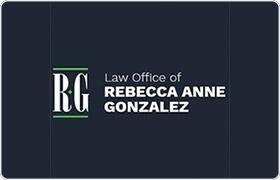Helotes Divorce & Family Law Lawyer, Texas
Sponsored Law Firm
-
 x
x

Click For More Info:
-
Law Office of Rebecca Anne Gonzalez
10101 Reunion Place Suite 615 San Antonio, TX 78216» view mapDivorce & Family Law Continuing The Gonzalez Legacy
At the Law Office of Rebecca Anne Gonzalez, my goal is to make certain you feel taken care of. My team and I work hard to protect what is important to you.
800-735-1530
Andy Tiwari
Business, Divorce & Family Law, Personal Injury, Litigation
Mark William Laneman
Family Law, Consumer Bankruptcy, Criminal, Wills
Status: In Good Standing Licensed: 14 Years
Louis A. Manganiello
Intellectual Property, Family Law, Business & Trade, Business
Status: In Good Standing Licensed: 50 Years
 Rebecca Gonzalez San Antonio, TX
Rebecca Gonzalez San Antonio, TX Practice AreasExpertise
Practice AreasExpertise
